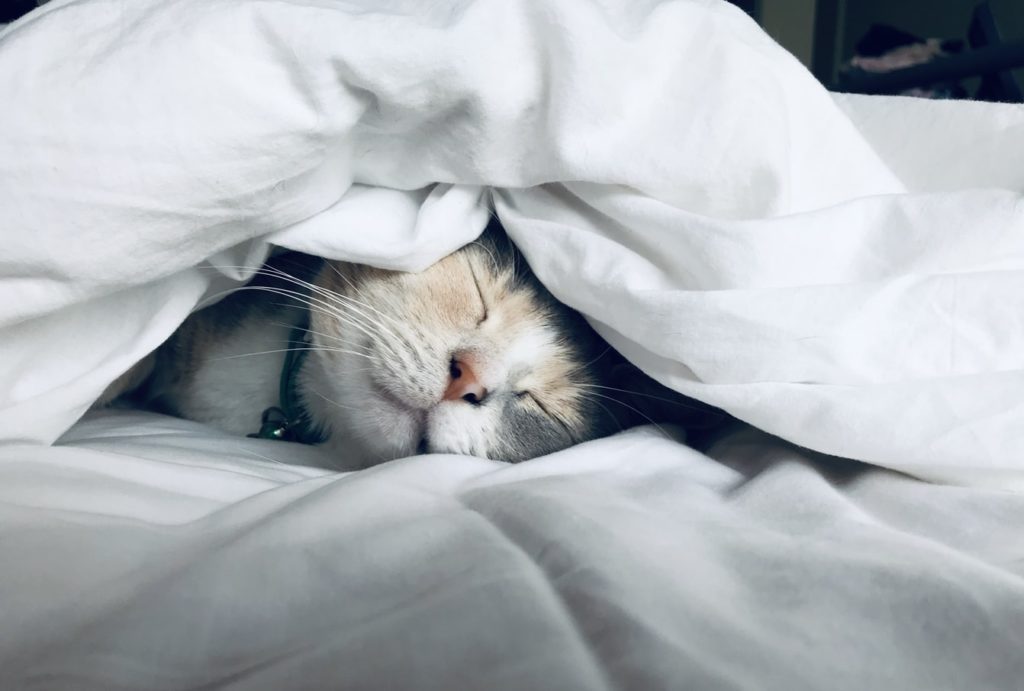
Do you dream of French? How to Talk About Sleep in French and Bring Your Dreams to Life
You know, the one where you’re enjoying crêpe Suzette (thin dough filled with butter and orange sauce) at an outdoor Parisian café in spring.
Or the one where you’re exploring the sun-kissed beaches of Marseille.
Don’t worry. Dreams can come true.
In fact, learning how to talk about sleep itself can get you one step closer.
Sleep is a significant part of your life, making it perfect to learn about in French.
In this post, we’ll show you how to say goodnight, discuss quality of sleep, talk about sleeping habits and more in French.
You, no doubt, love sleep. Then why not say so in French?
Sleep in Context… in French!
Sleep, as part of the fabric of universal human experience, is obviously a highly practical topic to study.
Nevertheless, unless you’re currently in a French-speaking country or live with a French speaker, you may not have many immediate opportunities to tell someone bonne nuit (good night) or seek comfort after un cauchemar (nightmare) in French.
These resources will help you see these words and phrases employed in real French content. If you’re an intermediate learner, this is a good chance to practice reading and listening comprehension as well. Even if you’re more of a beginner, finding words you can recognize helps boost your confidence and reinforces the vocabulary.
“13 conseils pour mieux dormir” (13 Tips to Sleep Better)
This article, published in the well-known French news outlet Le Figaro, gives advice for more restful sleep.
If reading the whole article is a bit intimidating, focus on the headings in bold. They’re shorter and summarize the author’s main ideas, and you’ll still find some relevant words discussed here, like se réveiller (to wake up).
“Les insomnies” (The Insomniacs)
This French comedy video about insomnia documents the struggle of getting a good night’s rest when your body just won’t cooperate. Norman is a famous French YouTuber who makes five-minute clips finding humor in everyday experiences, like trying to fall asleep!
Since timing is key in humor, he often speaks quickly, so this isn’t the easiest video for language learners. However, a challenge is always good, since it exposes you to authentic French—and I won’t blame you for turning on the English subtitles! Even so, try to find even basic words you recognize, like dormir (to sleep) or le sommeil (sleep).
“Quels sont les bienfaits de la sieste ?” (What Are the Benefits of a Nap?)
This post, written for a French health site, discusses why taking naps is good for one’s health and how to nap wisely. It covers questions such as when to nap, for how long and why it works.
As with the first article, most beginners won’t be able to read this in full, but looking for vocabulary words and paying extra attention to headings will still make for good review.
Preparing for Sleep
Sleep doesn’t just happen. You probably have your own bedtime routine or people to whom you say “good night.” Here are some phrases you might use as your eyes begin to grow heavy:
Être fatigué (To be tired)
Être épuisé (To be exhausted)
Avoir sommeil (To be sleepy)
This phrase specifically pertains to the desire for sleep; fatigué (tired) is broader and may or may not be referring to the need to sleep.
Bonne nuit (Good night)
This is the appropriate salutation for someone going to bed.
Fais de beaux rêves (Sweet dreams)
Like bonne nuit, this phrase is said to someone going to sleep. It’s an imperative form that literally means “make good dreams.” The formal (vous) counterpart is faites de beaux rêves.
Bonsoir (Good evening)
This is how you’d greet someone after it gets dark, but before it’s bedtime. Check out this video from HowCast, which reviews the different evening salutations for a clearer understanding of when to use which phrase.
Dors bien (Sleep well)
This is also an imperative (command) form. The formal version is dormez bien.
Example:
— Bonne nuit, maman. Je vais me coucher. (Goodnight, mom. I’m going to bed.)
— Es-tu fatigué ? (Are you tired?)
— Oui, j’étais épuisé après l’examen cet après-midi. Et maintenant j’ai sommeil. (Yes, I was exhausted after the exam this afternoon. And now I’m sleepy.)
— Bien sûr. Fais de beaux rêves. (Of course. Sweet dreams.)
Places to Sleep
Hopefully you sleep in a bed most nights, but what about if you’re camping or traveling? Here are some sleep location words to build your vocabulary:
Un lit (A bed)
Un canapé (A couch)
Une couchette (A bunk)
This word could describe bunk beds, the set-up of a hostel or military base as well as sleeping accommodations on a train or boat.
Un wagon-lit (A sleeping car)
This describes the part of the train where bunks are located.
Un sac de couchage (A sleeping bag)
Dormir à la belle étoile (To sleep outdoors)
This phrase literally means “to sleep at the beautiful star.” It carries the idea of sleeping outside and depending on context, it could be translated as “to sleep under the stars” or “to sleep out in the open.”
Example:
Bien sûr, on dort dans un lit presque toujours. (Of course, we almost always sleep in a bed.)
Mais de temps en temps, je m’endors sur le canapé pendant un film. (But occasionally, I fall asleep on the couch during a movie.)
L’année dernière, on a pris le train en Russie et on passait les nuits dans le wagon-lit. (Last year, we took the train in Russia and we spent the nights in the sleeping car.)
Quand on fait du camping, il est génial de prendre un sac de couchage et dormir à la belle étoile. (When we go camping, it’s great to take a sleeping bag and sleep under the stars.)
Going to Sleep
These phrases describe actions associated with entering the state of sleep:
Dormir (To sleep)
This brief video from French with Alexa reviews how to conjugate dormir, which doesn’t quite follow the pattern of other verbs ending in -ir. Le sommeil (sleep) is the noun form.
Se coucher (To go to bed)
When this verb doesn’t have a reflexive pronoun, it means to put somebody to bed. For instance, il couche ses enfants vers huit heures. (He puts his children to bed around eight o’clock).
Faire dodo (To go night-night)
This is a cute phrase derived from the more proper dormir and is mainly used with children, just like the English phrase “night-night.”
Fermer les yeux (To close the eyes)
S’endormir (To fall asleep)
This phrase refers to the actual passing from consciousness to slumber.
Example:
Son but est de dormir au moins huit heures chaque nuit. (Her goal is to sleep at least eight hours each night.)
Donc son fils doit faire dodo à vingt heures et demi. (Therefore, her son needs to go night-night at 8:30.)
Après cela, elle lit ou regarde la télé et se couche à vingt-deux heures. (After that, she reads or watches TV and goes to bed at 10.)
Elle ferme les yeux et, d’habitude, s’endort avant vingt-trois heures. (She closes her eyes and usually falls asleep before 11.)
Waking Up
Sooner or later, you’ll have to get up, whether it’s to a quiet morning at home or a hectic morning on the job.
Un réveil (An alarm clock)
Un réveille-matin is a somewhat old-fashioned synonym.
Se réveiller (To wake up)
Se lever (To rise, get up)
Here are two related phrases you may want to know:
Se lever tòt (To get up early)
Se lever tard (To get up late)
Faire la grasse matinée (To sleep in)
Example:
D’habitude, mon réveil sonne à sept heures et je dois me lever tout de suite. (Usually, my alarm clock goes off at seven and I need to get up right away.)
Mais le week-end, je fais la grasse matinée. (But on the weekend, I sleep in.)
Quand je me réveille, je peux lire ou regarder la télé avant de me lever. (When I wake up, I can read or watch TV before getting up.)
Describing Sleep in French
Sleep is a common component of small talk, right up there with the weather. Here’s how to get ready for the inevitable question:
Comment avez-vous dormi ? (How did you sleep?)
The informal way to ask is comment as-tu dormi ?
Dormir bien (To sleep well)
Dormir mal (To sleep badly)
Dormir d’un sommeil de plomb (To sleep like a stone)
This idiomatic expression literally means “to sleep a sleep of lead.” It describes a deep, heavy sleep.
Un rêve (A dream)
Although unrelated to sleep, it could be helpful to know that a “daydream” is un rêve éveillé or une rêverie.
Un cauchemar (A nightmare)
Example:
— Bonjour. Comment as-tu dormi ? (Good morning. How did you sleep?)
— J’ai mal dormi. J’ai eu un cauchemar. Et toi ? (I slept badly. I had a nightmare. And you?)
— Je suis désolé. Moi, j’ai dormi d’un sommeil deplomb ! (I’m sorry. Me, I slept like a stone!)
Naps and Resting
Sometimes the nightly zzzz’s just aren’t enough. Here are some words to describe naps and other forms of resting:
Une sieste (A nap)
This term derives from the Spanish word siesta, which refers to the after-lunch rest practiced in Spain and some other Mediterranean countries.
Although a daily nap is less widespread in other European countries such as France and Germany, it’s not uncommon. It just depends on the person and his/her schedule.
Un somme (a nap) is a synonym. Be careful, though, because une somme means “a sum,” as in math or finances.
Se reposer (To rest)
Se détendre (To relax)
S’apaiser (To calm down)
Une pause (A break)
Example:
Elle ne peut pas faire une sieste chaque jour. (She can’t take a nap every day.)
Mais le samedi elle prend une pause du travail et des études. (But on Saturdays she takes a break from work and studies.)
Elle boit du thé pour se détendre et elle se repose la plupart de la journée. (She drinks some tea to relax and she rests most of the day.)
Parfois, elle fait un somme. (Sometimes, she takes a nap.)
Feeling sleepy yet?
Whether you’re ready for a nap now or have a full day ahead, you’re now equipped to talk all about sleep in French.
Sleep on, French learners.




